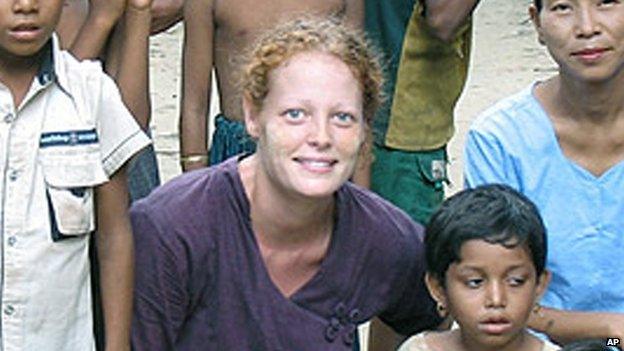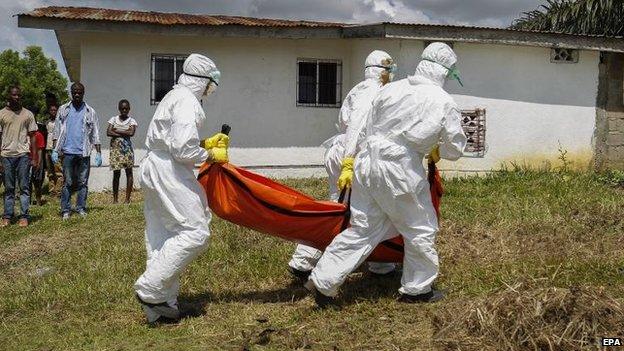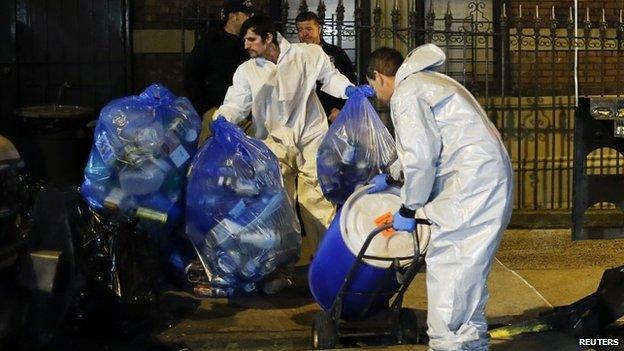Ebola outbreak: US nurse to be discharged from quarantine
- Published

Kaci Hickox was working with Medecins Sans Frontieres (MSF) in Sierra Leone before her return to the US
A nurse who was quarantined in New Jersey after treating Ebola patients in Sierra Leone will be discharged after showing no symptoms for 24 hours.
Kaci Hickox will be flown to her home state of Maine, officials said.
She threatened legal action over the confinement, saying she felt like a criminal after returning to the US.
Also on Monday, the UN secretary general said, external health workers returning from West Africa without symptoms should not be quarantined.
Ban Ki-moon has previously warned isolating those travelling to combat Ebola would hamper efforts to stop the disease.
Newly instated rules in New York, New Jersey and Illinois require a 21-day quarantine for all health workers who have had contact with Ebola patients in West Africa upon their return to the US.
The measures were announced after a New York doctor who had treated patients in Guinea fell ill with Ebola last week.

Liberia remains the worst affected country, with 4,665 cases
Amid criticism the quarantine rules were overly strict, New York Governor Andrew Cuomo eased his state's restrictions on Sunday, allowing returning health workers to pass the quarantine period in their homes.
More than 10,000 people have contracted the Ebola virus, with 4,922 deaths, according to the World Health Organization's latest figures, external.
All but 27 of the cases have occurred inside Sierra Leone, Liberia and Guinea.
Separately on Monday, a five-year-old boy was being tested for Ebola at Bellevue Hospital in New York City after visiting an Ebola-stricken country and developing a fever, hospital officials said. Test results were expected later in the day.
The New Jersey health department said Ms Hickox had tested negative for Ebola on Saturday and had been free of symptoms for 24 hours.
Governor Chris Christie, who had earlier defended his state's quarantine procedures, said the US Centers for Disease Control and Prevention (CDC) had overseen her treatment in New Jersey, and said he was "hopeful" the hospital would be able to release her on Monday.
"I understand that she didn't want to be there," Mr Christie said.
"She made that very clear from the beginning, but my obligation is to all the people of New Jersey and we're just going to continue to do that."
Anne Soy: "The world is dealing with two epidemics - the bigger one is that of fear"
Maine Governor Paul LePage said his state would allow Ms Hickox to pass the quarantine period in her home.
"We will help make sure the healthcare worker has everything to make this time as comfortable as possible," he said.
Ms Hickox, who worked for medical charity Medecins Sans Frontieres (MSF), arrived at Newark Airport on Friday and was placed in isolation after developing a fever, the state health department said.
New York Mayor Bill de Blasio has described Ms Hickox as a "returning hero", but said that she had been "treated with disrespect" when put into quarantine.
New York Governor Andrew Cuomo: "Some people will say we're being too cautious - I'll take that criticism because it's better than the alternative"
"We owe her better than that and all the people better than that," he told reporters outside New York's Bellevue Hospital, where an American doctor, Craig Spencer, is being treated for the virus.
The stricter measures were put in place after Dr Spencer tested positive for Ebola on his return from Guinea last week and unwittingly moved around the city before the symptoms developed.
Meanwhile, UN Secretary General Ban said he was "concerned" about recent restrictions put in place in several countries and localities.
"Returning health workers are exceptional people who are giving of themselves for humanity," a spokesman for Mr Ban said in a statement.
"They should not be subjected to restrictions that are not based on science. Those who develop infections should be supported, not stigmatised."

Workers clean the apartment of Dr Craig Spencer, currently being treated for Ebola in New York City
Separately, the Pentagon has said about a dozen US troops returning from West Africa are being isolated at a base in Italy "out of an abundance of caution".
Pentagon spokesman Col Steven Warren told reporters none of the soldiers displayed symptoms of Ebola.

Ebola virus disease (EVD)
How Ebola survivors’ blood is saving lives
Symptoms include high fever, bleeding and central nervous system damage
Spread by body fluids, such as blood and saliva
Fatality rate can reach 90% - but current outbreak has mortality rate of about 70%
No proven vaccine or cure
Fruit bats, a delicacy for some West Africans, are considered to be virus's natural host
